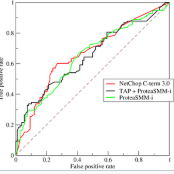Recent work by \citet{hendrycks2025agidefinition} formalized \textit{Artificial General Intelligence} (AGI) as the arithmetic mean of proficiencies across cognitive domains derived from the Cattell--Horn--Carroll (CHC) model of human cognition. While elegant, this definition assumes \textit{compensability} -- that exceptional ability in some domains can offset failure in others. True general intelligence, however, should reflect \textit{coherent sufficiency}: balanced competence across all essential domains. We propose a coherence-aware measure of AGI based on the integral of generalized means over a continuum of compensability exponents. This formulation spans arithmetic, geometric, and harmonic regimes, and the resulting \textit{area under the curve} (AUC) quantifies robustness under varying compensability assumptions. Unlike the arithmetic mean, which rewards specialization, the AUC penalizes imbalance and captures inter-domain dependency. Applied to published CHC-based domain scores for GPT-4 and GPT-5, the coherence-adjusted AUC reveals that both systems remain far from general competence despite high arithmetic scores (e.g., GPT-5 at~24\%). Integrating the generalized mean thus yields a principled, interpretable, and stricter foundation for measuring genuine progress toward AGI.
翻译:暂无翻译



